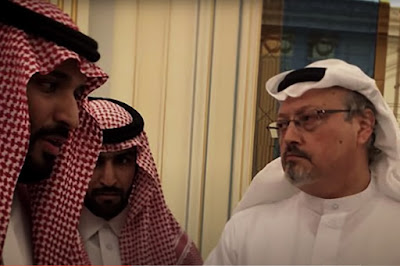The documentarist Bryan Fogel has been blessed with peerless timing. His Oscar-winning breakthrough film on the downfall of dodgy doc Grigory Rodchenko, 2017's Icarus, emerged just as the full scope of Russia's state-sponsored doping program was becoming apparent. His follow-up The Dissident lands among us a week after the release of a US intelligence report that concluded the Saudi crown prince Mohammed bin Salman "likely ordered" the killing of Washington Post columnist Jamal Khashoggi at Istanbul's Saudi consulate in October 2018. So far President Biden, in his role as America's nice grandpa, has refused to take any specific action - Saudi is big business, after all, and heaven forbid anyone should resist that - but the combined impact of report and film is damning. If people in positions of supposed power don't push back against murderous tyranny with this much evidence to hand, then when? The Oscar presumably helped Fogel obtain access to those at the heart of this story; what might appear a glitzy trinket in other contexts became key to unlocking exactly the testimony and documents required to make this case. The overwhelming majority of his interviewees sense Khashoggi's killing was an outrage: the Turkish prosecutor, police and forensics specialists forced to wait 13 days outside the Saudi consulate before they were allowed to enter; Khashoggi's fiancee Hatice, who herself waited for hours outside that building while her man was being carved up inside, and now awaits justice; the UN overseers, who appear slightly stunned none of their members have pursued this case further; and Omar Abdulaziz, friend of Khashoggi and representative of a younger generation of Saudi activists, who looks on balefully from snowy Canada (where he exists in exile), living, breathing proof that this story is very much ongoing.
The Dissident steps into the breach as something of a relay doc, then, a clear attempt on Fogel's part to pick up the stories and leads Khashoggi was running with at the time of his death, and to carry them forward. That partly accounts for its urgency: it's a continuation of previous investigations, some legwork already done, with a deadline that falls a little under two hours from the opening credits. (Icarus suggested Fogel could have been tempted to follow a career as a competitive cyclist, and both these films are driven by a need to beat the clock. That good timing isn't entirely accidental.) The bulk of the first hour recaps Khashoggi's own reporting and commentary from the past decade: his optimism amid the Arab Spring, his growing understanding of how it unsettled Saudi's rulers, how those rulers assisted the funding of counterrevolutionary activity in neighbouring states, how MBS in particular was emboldened by Donald Trump's victory in the 2016 election. There's one especially choice revelation here: that the much-memed photo of Trump and various Saudi officials laying hands on a glowing orb during the 2017 Riyadh summit was taken in a vast annexe subsequently used to house an army of state-sponsored Twitter trolls - "flies", as they're referred to locally - assembled precisely to swarm on prominent dissidents such as Khashoggi and Abdulaziz. Fogel has the (oddly exciting) inside line on how the latter were planning to fight back using an army of what they, in turn, called "bees": Saudi-based social media users armed with American-registered - and thus untraceable - SIM cards.
Inevitably, though, the most dramatic and disturbing material concerns the grim details of the murder itself. Here, Fogel methodically pieces together the one aspect of this crime that was withheld from public knowledge for as long as the Saudis could. (Their immediate response, you may remember, was the Bannonian one of flooding the zone with bullshit: contradictory reports as to the journalist's condition and whereabouts, ludicrous security-cam footage of a less than convincing Khashoggi lookalike.) Of all people, we apparently have Turkey's hardly journo-friendly President Erdoğan - grumpy about the Saudis flexing so much muscle on his turf - to thank for releasing key evidence to the West; another perception-scrambler follows late on, as Fogel shows us Republican senator Rand Paul breaking ranks with Trump and vocally denouncing the Saudis in Congress. The curious moral of this story as it stands may be that if you elect enough cranks and bullies, then like monkeys with typewriters, some of them will eventually - even if briefly - appear on the side of the angels. Then again, you'd surely have to be an out-and-out demon to be seen endorsing a crime this coldly premeditated. One of the reasons The Dissident hits so hard, when it does address the murder, is that work Fogel has done with Hatice to evoke Khashoggi the flesh-and-blood man: someone who wanted a better life for himself, his bride-to-be, and his fellow Saudis, who actually agreed with some of MBS's modernisation plans (if not his tactics), and who expressed a desire, even in his final moments, to someday return to his homeland on happier terms. Fogel pays him the tribute of taking up this cause with a passion and rigour Khashoggi - or, indeed, any advocate of press freedom - would surely want. If the Saudis responsible thought murdering Khashoggi would snuff out dissent, they badly miscalculated; their actions, laid out with this exemplary degree of clarity, seem likely only to provoke prolonged and justified outrage.
The Dissident is now available to rent as part of the Glasgow Film Festival here; it streams as part of the Dublin International Film Festival from Thursday.

No comments:
Post a Comment